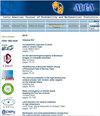具有随机终止时间的奇异BSDE的连续性问题
IF 0.6
4区 数学
Q4 STATISTICS & PROBABILITY
Alea-Latin American Journal of Probability and Mathematical Statistics
Pub Date : 2020-11-10
DOI:10.30757/alea.v19-49
引用次数: 1
摘要
我们研究了一类非线性BSDE,其超线性驱动过程f适用于过滤f并且在随机时间间隔[[0,S]]上,其中S是f的停止时间。允许终端条件$\neneneba xi$取+$\infty$的值,即奇异。我们的目标是在这种情况下展示BSDE的解决方案的存在。我们将通过证明BSDE的最小超解是一个解来做到这一点,即,以概率1获得终端值。我们考虑三种类型的终端值:1)马尔可夫:即,$\neneneba xi$的形式为$\nenenebb xi$=g($\nenenebc xi$S),其中$\nenenebd xi$是连续马尔可夫扩散过程,S是$\nenenebe xi$的命中时间,g是确定性函数;时间。对于一般的$\neneneba xi$,我们证明了最小超解在时间S是连续的,条件是F在时间S保持连续。我们称停止时间S相对于给定的BSDE是可解的,如果BSDE在终端时间S具有终端值为$\infty$的最小超解,则我们称过滤。可解的概念在许多论点中起着关键作用。最后,我们讨论了Markovian终端条件的结果对具有奇异边界条件的非线性椭圆型偏微分方程解的影响。本文章由计算机程序翻译,如有差异,请以英文原文为准。
Continuity problem for singular BSDE with random terminal time
We study a class of nonlinear BSDEs with a superlinear driver process f adapted to a filtration F and over a random time interval [[0, S]] where S is a stopping time of F. The terminal condition $\xi$ is allowed to take the value +$\infty$, i.e., singular. Our goal is to show existence of solutions to the BSDE in this setting. We will do so by proving that the minimal supersolution to the BSDE is a solution, i.e., attains the terminal values with probability 1. We consider three types of terminal values: 1) Markovian: i.e., $\xi$ is of the form $\xi$ = g($\Xi$ S) where $\Xi$ is a continuous Markovian diffusion process and S is a hitting time of $\Xi$ and g is a deterministic function 2) terminal conditions of the form $\xi$ = $\infty$ $\times$ 1 {$\tau$ $\le$S} and 3) $\xi$ 2 = $\infty$ $\times$ 1 {$\tau$ >S} where $\tau$ is another stopping time. For general $\xi$ we prove the minimal supersolution is continuous at time S provided that F is left continuous at time S. We call a stopping time S solvable with respect to a given BSDE and filtration if the BSDE has a minimal supersolution with terminal value $\infty$ at terminal time S. The concept of solvability plays a key role in many of the arguments. Finally, we discuss implications of our results on the Markovian terminal conditions to solution of nonlinear elliptic PDE with singular boundary conditions.
求助全文
通过发布文献求助,成功后即可免费获取论文全文。
去求助
来源期刊

Alea-Latin American Journal of Probability and Mathematical Statistics
STATISTICS & PROBABILITY-
CiteScore
1.10
自引率
0.00%
发文量
48
期刊介绍:
ALEA publishes research articles in probability theory, stochastic processes, mathematical statistics, and their applications. It publishes also review articles of subjects which developed considerably in recent years. All articles submitted go through a rigorous refereeing process by peers and are published immediately after accepted.
ALEA is an electronic journal of the Latin-american probability and statistical community which provides open access to all of its content and uses only free programs. Authors are allowed to deposit their published article into their institutional repository, freely and with no embargo, as long as they acknowledge the source of the paper.
ALEA is affiliated with the Institute of Mathematical Statistics.
 求助内容:
求助内容: 应助结果提醒方式:
应助结果提醒方式:


